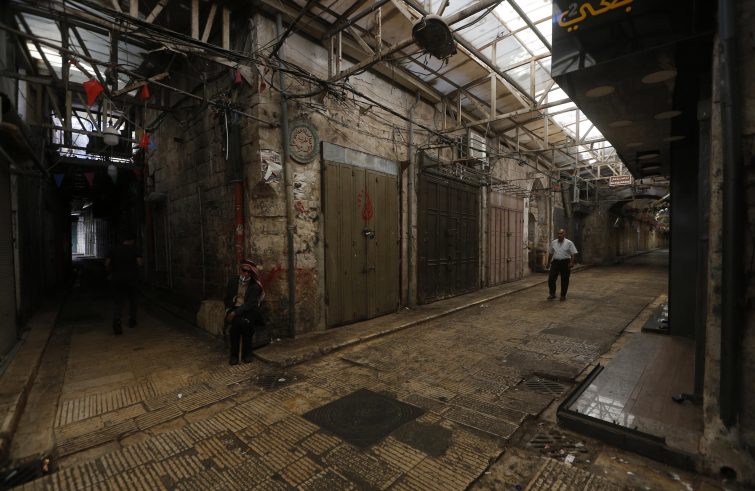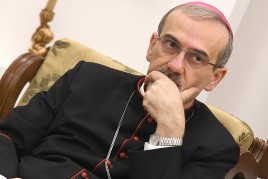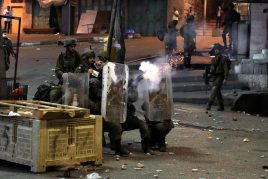
“Jerusalem is the heart of the problem. On this occasion it acted as the spark that ignited the conflict in the country. This crisis shows that the current strategy does not work and that no solution on Jerusalem can be imposed. The only way to reach a solution is through dialogue between Israelis and Palestinians, both of whom will be required to embrace the city’s open, multi-religious and multi-cultural vocation”, writes the Latin Patriarch of Jerusalem, Pierbattista Pizzaballa, in a note sent to SIR, offering a reading of the clashes and violence that have been raging for days in Jerusalem, Gaza, as well as in many Israeli cities and in the West Bank.
 “Open and painful wound.” “It all started with what is now the notorious case of Shekh Jarrah, presented as a legal issue.” said the Patriarch. “However, it is evidently also a political decision aimed at further expanding Jewish settlements in East Jerusalem. This decision is a disruption of the precarious stability between the two parts of the city and a source of tension and suffering. According to Msgr. Pizzaballa, what he said about Jerusalem “can be applied” to the Israeli-Palestinian question, that must resume “a central role on the international agenda.” It is “an open and painful wound, concealed, but unhealed. Once the bandage that covered it was removed, it became visible and painful again, perhaps even more so than in the past.” “The Palestinian people have been awaiting a dignified solution for years, a peaceful future in their land, in their country. But there seems to be no place for them in the world, and they are continually invited by the various Chancelleries to await an unknown and continually postponed fate rather than being allowed to live with dignity in their homeland.”
“Open and painful wound.” “It all started with what is now the notorious case of Shekh Jarrah, presented as a legal issue.” said the Patriarch. “However, it is evidently also a political decision aimed at further expanding Jewish settlements in East Jerusalem. This decision is a disruption of the precarious stability between the two parts of the city and a source of tension and suffering. According to Msgr. Pizzaballa, what he said about Jerusalem “can be applied” to the Israeli-Palestinian question, that must resume “a central role on the international agenda.” It is “an open and painful wound, concealed, but unhealed. Once the bandage that covered it was removed, it became visible and painful again, perhaps even more so than in the past.” “The Palestinian people have been awaiting a dignified solution for years, a peaceful future in their land, in their country. But there seems to be no place for them in the world, and they are continually invited by the various Chancelleries to await an unknown and continually postponed fate rather than being allowed to live with dignity in their homeland.”
 “Outbreak of hatred.” Even more “worrying”, writes Msgr. Pizzaballa, “is the outbreak of violence in Israel’s mixed cities, where Jews and Arabs have been living together for a long time, given limited coverage by the international media. We have witnessed outbreaks of violence, organised raids, attempts at lynching on both sides, Jews and Arabs. An outpouring of hatred and contempt for the other that had probably been smouldering for some time has now violently erupted and found everyone unprepared and scared.” All of this, writes the Patriarch, “is the product of years of violent political speech, of a culture and politics of rejection of the other, of contempt. Little by little, these attitudes have caused a growing divide between the two peoples, a divide that we were perhaps unaware of until today. It will take a long time to repair these deeply damaged relations. It will require us to work together with the numerous people of all faiths who still believe in and are committed to a shared future. They are many. But they need support. They need someone who understands and is able to convey their voices to the whole world.” The “priority” for rebuilding relations “is to start from the painful experience of these past few days, that is, from the resentment that was smouldering especially in the hearts of young people. While it may be unpopular to discuss this at the moment, we must not cultivate or allow the growth of any feelings of hatred. It is our duty to ensure that no one, whether Jew or Arab, feels rejected. We will have to be more forthright in denouncing whatever causes divisions.”
“Outbreak of hatred.” Even more “worrying”, writes Msgr. Pizzaballa, “is the outbreak of violence in Israel’s mixed cities, where Jews and Arabs have been living together for a long time, given limited coverage by the international media. We have witnessed outbreaks of violence, organised raids, attempts at lynching on both sides, Jews and Arabs. An outpouring of hatred and contempt for the other that had probably been smouldering for some time has now violently erupted and found everyone unprepared and scared.” All of this, writes the Patriarch, “is the product of years of violent political speech, of a culture and politics of rejection of the other, of contempt. Little by little, these attitudes have caused a growing divide between the two peoples, a divide that we were perhaps unaware of until today. It will take a long time to repair these deeply damaged relations. It will require us to work together with the numerous people of all faiths who still believe in and are committed to a shared future. They are many. But they need support. They need someone who understands and is able to convey their voices to the whole world.” The “priority” for rebuilding relations “is to start from the painful experience of these past few days, that is, from the resentment that was smouldering especially in the hearts of young people. While it may be unpopular to discuss this at the moment, we must not cultivate or allow the growth of any feelings of hatred. It is our duty to ensure that no one, whether Jew or Arab, feels rejected. We will have to be more forthright in denouncing whatever causes divisions.”
 A new alliance. “We must not be content with inter-religious peace meetings, expecting that this will solve the problem of coexistence,” Msgr. Pizzaballa affirmed in no uncertain terms.
A new alliance. “We must not be content with inter-religious peace meetings, expecting that this will solve the problem of coexistence,” Msgr. Pizzaballa affirmed in no uncertain terms.
“We will have to work hard to ensure that the name of God, neighbour, and life companion, resonate throughout our schools, institutions, media, politics and places of worship. We will have to learn to be more careful about the language we use and understand that rebuilding a sound model of relations between us will take time, patience and courage. We will need a new alliance, between people of good will who, regardless of faith, identity and political vision, feel the other person as being part of themselves and are committed to putting this into practice.” Msgr. Pizzaballa invited all to pray for the Church of Jerusalem, “that it may be a Church that transcends walls and closed doors; that believes, proclaims and builds peace. Too many times we have experienced announcements of peace being betrayed and wronged.”









